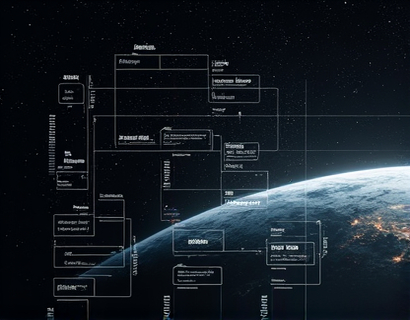Maximizing Leadership Effectiveness: A Comprehensive Dashboard for Efficient Team Management and Enhanced Productivity Across Industries
In today's fast-paced business environment, effective leadership is crucial for driving success and maintaining a competitive edge. Leaders are tasked with managing diverse teams, making strategic decisions, and ensuring that operations run smoothly. However, the complexity of managing large teams across various industries can pose significant challenges. To address these challenges, a comprehensive dashboard designed to streamline leadership tasks, enhance communication, and boost productivity is essential. This article explores how such a dashboard can transform the way leaders manage their teams and drive organizational success.
Understanding the Need for a Comprehensive Dashboard
The traditional methods of team management, such as spreadsheets and manual reporting, are often inefficient and time-consuming. These methods can lead to miscommunication, delays in decision-making, and a lack of real-time visibility into team performance. A comprehensive dashboard addresses these issues by providing a centralized platform where leaders can monitor key metrics, track progress, and make data-driven decisions. This tool is particularly valuable for leaders managing large, diverse teams where visibility and control are critical.
Key Features of an Effective Dashboard
A well-designed dashboard should encompass several key features to maximize leadership effectiveness:
- Real-Time Data Visualization: Dashboards should provide real-time insights through charts, graphs, and KPIs. This immediate access to data allows leaders to quickly identify trends, spot issues, and take corrective actions.
- Customizable Dashboards: Each leader's needs are unique, so the ability to customize the dashboard to focus on specific metrics and KPIs is essential. This personalization ensures that leaders can monitor what matters most to their team and organization.
- Integrated Communication Tools: Effective communication is vital for team success. A comprehensive dashboard should include integrated communication tools such as chat, video conferencing, and notification systems to keep teams connected and informed.
- Task and Project Management: Features that allow for task assignment, progress tracking, and deadline management help leaders ensure that projects stay on track and team members are accountable for their responsibilities.
- Performance Analytics: In-depth analytics and reporting tools enable leaders to assess individual and team performance, identify areas for improvement, and recognize achievements.
Enhancing Communication and Collaboration
One of the most significant benefits of a comprehensive dashboard is its ability to enhance communication and collaboration within teams. Traditional communication methods often lead to information silos and misunderstandings. A dashboard with integrated communication tools breaks down these barriers by:
- Providing a single source of truth where all team members can access relevant information and updates
- Facilitating seamless communication through built-in chat and messaging systems
- Enabling video conferencing for remote teams to maintain face-to-face interactions
- Offering notification systems to ensure important messages and updates are not missed
By centralizing communication, leaders can foster a more collaborative and transparent work environment, which is essential for high-performing teams.
Streamlining Decision-Making Processes
Effective leadership is heavily dependent on timely and informed decision-making. A comprehensive dashboard streamlines this process by:
- Providing real-time data and insights that help leaders make quick and accurate decisions
- Offering predictive analytics to forecast trends and potential issues, allowing for proactive rather than reactive management
- Integrating with other business tools and systems to gather data from various sources in one place
- Enabling scenario planning and simulation to evaluate different decision outcomes
These features empower leaders to make data-driven decisions, reducing the risk of errors and improving overall efficiency.
Boosting Productivity and Efficiency
The ultimate goal of a comprehensive dashboard is to drive productivity and efficiency across the organization. By:
- Automating routine tasks and workflows, freeing up time for leaders to focus on strategic initiatives
- Providing clear visibility into team performance and project status, allowing for better resource allocation and prioritization
- Enhancing collaboration and communication, reducing delays and miscommunications
- Offering actionable insights through analytics and reporting, enabling continuous improvement
A comprehensive dashboard helps organizations operate more smoothly and achieve their goals more effectively.
Industry-Specific Applications
The benefits of a comprehensive dashboard extend across various industries, each with its unique challenges and requirements:
Technology and Software Development
In the tech industry, where projects are often complex and fast-paced, a dashboard can help project managers:
- Track development milestones and code integration
- Monitor bug reports and resolution times
- Manage agile sprints and user stories
- Collaborate with cross-functional teams including design and QA
These features ensure that development projects stay on track and deliver high-quality results.
Healthcare
In healthcare, a dashboard can assist managers in:
- Monitoring patient flow and resource utilization
- Tracking staff schedules and compliance with regulations
- Managing patient records and treatment plans
- Enhancing communication between different departments to improve patient care
These capabilities help healthcare organizations operate more efficiently and provide better patient outcomes.
Manufacturing
For manufacturing companies, a dashboard can be instrumental in:
- Monitoring production lines and equipment performance
- Managing inventory levels and supply chain logistics
- Tracking quality control metrics and compliance
- Coordinating shift schedules and workforce management
These tools help manufacturers optimize their operations and maintain high standards of quality and efficiency.
Implementing a Comprehensive Dashboard
Implementing a comprehensive dashboard requires careful planning and execution. Here are some steps to consider:
1. Assess Needs: Conduct a thorough analysis of your organization's specific needs and challenges to determine the key features required.
2. Select the Right Platform: Choose a dashboard platform that is scalable, flexible, and integrates well with existing systems.
3. Customize and Configure: Tailor the dashboard to fit your organization's workflows and processes, ensuring it meets the unique needs of different teams and departments.
4. Train Users: Provide comprehensive training to ensure that all users understand how to use the dashboard effectively.
5. Monitor and Adjust: Continuously monitor the dashboard's performance and make adjustments as needed to optimize its effectiveness.
By following these steps, organizations can successfully implement a comprehensive dashboard that enhances leadership effectiveness and drives overall success.
Conclusion
A comprehensive dashboard is a powerful tool for modern leaders looking to maximize their effectiveness in managing large, diverse teams. By providing real-time insights, enhancing communication, streamlining decision-making, and boosting productivity, such a dashboard can transform the way organizations operate. Whether in technology, healthcare, manufacturing, or any other industry, the benefits of a well-implemented dashboard are clear. Leaders who embrace this technology are better positioned to achieve their goals and drive their organizations toward success.










































